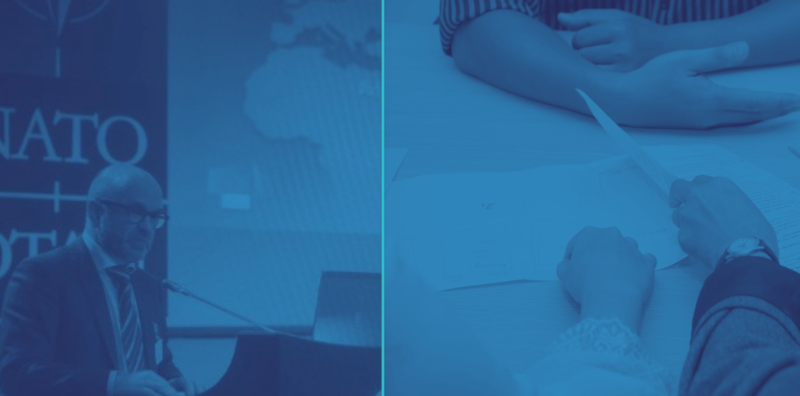
Interview conducted by: Ema Odra Raščan
George Voskopoulos, PhD is an Associate Professor of European Studies and the former Head of the Department of International and European Studies at the University of Macedonia. He was a Thematic Research Coordinator at the Jean Monnet Centre of Excellence from 2015 to 2018. Dr. Voskopoulous began his academic career by conducting his Ph.D. in comparative foreign policy analysis and focused on the Common Foreign and Security Policy of the European Union at Exeter University. He was a visiting fellow at the University of Russe in Bulgaria from 2001 until 2003, before continuing to work as a research associate at the University of Sheffield and at the Luxembourg Institute for International and European Studies. His research has been published in journals around the word and he is currently an editorial board member of a number of international journals. He is also the editor of “European Union Security and Defence: Policies, Operations and Transatlantic Challenges” (Spinger, 2020) and “Transatlantic Relations and European Integration: Realities and Dilemmas” (ICFAI Press, Hyderabad, 2006).
Ema Odra Raščan: As the European Commission wishes to establish a European Digital Decade, many EU Member States are concluding bilateral partnerships when it comes to fifth-generation wireless broadband networks. Greece is no exception. In September 2020 after a visit from the U.S. Secretary of State Mike Pompeo to the Greek Prime Minister Kyriakos Mitsotakis, U.S. commitment and support to Greece were reaffirmed. Does Greece see the future of its foreign policy within theEU or driven by bilateral relationships with big players in the international community?
Prof. Voskopoulos, Ph.D.:The original primary aim of Greece to join the (then) EEC was related to security issues. This overlaid the fact that the country was not competitive enough to join a club of industrially advanced states. As a result, Greece supported all endeavors of “federal” orientation (i.e. a European Army, CFSP, ESDP). For organizational and constitutional reasons (a Treaty-based Union) these aims were materialized in a way that did not resolve complex Greek security dilemmas and Greece is the only EU country still facing a military threat, not perceived but actual. Under this spectrum, Greek foreign policy has invested on trilateral or multilateral cooperation (i.e. Israel, Cyprus, Egypt, UAE, U.S.) to cover this need and the organizational and operational realities of CFSP, ESDP.
Raščan: In relation to the former relations that Greece is reviving with the U.S. – is Greece leading its own national politics towards BRIC (Brazil, Russia, India, and China) countries or is Greece following the dictation of the US in this regard?
Prof. Voskopoulos, Ph.D.: Ever since 1952 when Greece joined NATO, Greek leadership has explicitly made clear where the country belongs (the West). This has never been questioned in terms of strategic orientation. Yet, allies in NATO could not carry the burden of actual Greek regional security issues, namely the Greek-Turkish issues. The Alliance is not an intra-alliance member conflict resolution mechanism. The U.S. has been a strategic ally able to interfere and operate as a facilitator and at times was able to use its persuasive credibility. Athens has always had great expectations from a strategic partnership in which the political system has invested a lot. Greek foreign relations have been re-orientated to the degree choices which covered minimum requirements of a cost-effective compromise (i.e. the compromise with North Macedonia). In Athens there is a sense of not getting enough support from the U.S. vis-à-vis Turkey. Washington is trying to balance relations with two major allies and this causes choice dilemmas, never experienced in the past. Yet, the current situation was created by T. Erdogan’s choice to question the post Second World War order. In effect he questions the very essence of the Truman doctrine. His alliance with Moscow goes beyond historical precedent, as it brings together two fundamental different worlds, namely Neo-Ottomanism and Pan Slavism and rams the security edifice of the Alliance.
China is an investor in the country and has taken advantage of the vacuum in infrastructure projects and the fact that other players did not act in a decisive way. Actually it has done the same across the Balkans, where its investments range from telecommunications to media. Russia has never been a strategic option for Greece. This evaluation is based on concrete history and geostrategic parameters. Moscow wishes to extend its influence in the Balkans, yet post-Cold War order has created a multifaceted premium that makes this target unattainable. The degree Russia could influence Greek foreign policy has been rather exaggerated. Greek-American relations have been the basis of Athens international stance.
Raščan: I would also like to highlight the fire-damage on the Moria Camp in Lesvos, which happened in September 2020. Since 2015, Greece has been one of the two ‘hotspot’ (first reception facilities) countries, with the aim to improve coordination of the EU agencies’ and national authorities’ efforts at the external borders of the EU, in the initial reception, identification,registration and fingerprinting of asylum-seekers and migrants. How do you view the actions within European Institutions in the past five years? Have there been constructive developments in the field of migration, which could help divide the burden on Greece as one of the ‘hotspots’?
Prof. Voskopoulos, Ph.D.: First, we should make a distinction between refugees and migrants. These groups are driven by different motives, namely war and poverty. Greece is the major entry spot in the EU and this by default brings it to a difficult and unique, in terms of urgency, position. Not everyone in the EU has been willing to share this burden. The lack of a de jure refugee-migrant common European policy creates major humanitarian, management and practical issues, not to mention the pressure by far right groups. A European policy that leaves space for differentiation among member states by definition puts pressure on the countries that constitute entry points. Last but not least, one should look at Turkey’s role in using the crisis as leverage against the EU. A comprehensive deal is needed and above a mechanism to observe the terms agreed.
Raščan: Continuing by looking at the Greek geostrategic position – how do you assess Greece-Turkey relations and is there a future within this connection? In 2020 these have escalated within maritime zones in the Aegean and Eastern Mediterranean. Do you think that the Greek warnings to the European Commission to rethink relations with Turkey are being heard and taken into account?
Prof. Voskopoulos, Ph.D.: In terms of history, geography and geopolitics Turkey is a major contributor to the West’s defence. Culturally it is probably the closest you can find to Greece. Yet, culture and personal feelings are not enough to deal with conflict when the stakes are high. In this case it is sovereign rights, vital national interests. At a time the international system is in transition and history has shown that there is no space for “empires” built and organized according to past examples (i.e. Ottoman empire), Turkish leadership has advanced the idea of turning the country into a global player. When this cognitive idea turns into an operational scheme questioning international law and an order supported by international treaties, by default it alarms friends and foes. It simply goes outside standard norms of a state’s international behavior. Eventually this attitude brings Turkey closer to Moscow’s international behavior (i.e. Crimea, Ukraine).
A democratic Turkey operating outside a neo-revisionist dream should be the goal of everyone. But it takes a leader to nurture this idea and make it a common goal. The EU is trying to find ways to lure Turkey into a deal because it is a parameter of European security. A special de jure relationship with Ankara should be the nominal target. Actually in political terms this is the only viable way ahead.
Raščan: Lastly, how do you envision a future for Greece in the EU?
Prof. Voskopoulos, Ph.D.: Greece has profited a lot from EU membership. So many infrastructure works have been co-founded or founded by the EU. It has been a net beneficiary of the European project. Greek policies towards European integration have been a facilitating factor in the process of moving ahead. The fiscal crisis constituted a shock for both Greece and its allies, as it externalized issues and structural deficiencies never scrutinized in the past.
Greek foreign policy agenda coincides with the EU’s main strategies (i.e. Western Balkans) and this is a very important issue in terms of operating as a systemic local stabilizer in the Balkans.

 The ’Ndrangheta’s Infiltration and Threat to European Institutions
The ’Ndrangheta’s Infiltration and Threat to European Institutions  From Paper to Practice: How Grassroots Norms Undermine Gender Rights in Pakistan
From Paper to Practice: How Grassroots Norms Undermine Gender Rights in Pakistan  Exploited Childhoods: The Role of Global Corporations in Perpetuating and Mitigating Child Labour
Exploited Childhoods: The Role of Global Corporations in Perpetuating and Mitigating Child Labour  Human Rights Challenges in Addressing SLAPPs in Media, NGOs and Journalism in the EU
Human Rights Challenges in Addressing SLAPPs in Media, NGOs and Journalism in the EU 


